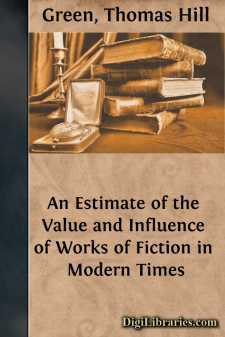Categories
- Antiques & Collectibles 13
- Architecture 36
- Art 48
- Bibles 22
- Biography & Autobiography 813
- Body, Mind & Spirit 142
- Business & Economics 28
- Children's Books 14
- Children's Fiction 11
- Computers 4
- Cooking 94
- Crafts & Hobbies 4
- Drama 346
- Education 46
- Family & Relationships 57
- Fiction 11828
- Games 19
- Gardening 17
- Health & Fitness 34
- History 1377
- House & Home 1
- Humor 147
- Juvenile Fiction 1873
- Juvenile Nonfiction 202
- Language Arts & Disciplines 88
- Law 16
- Literary Collections 686
- Literary Criticism 179
- Mathematics 13
- Medical 41
- Music 40
- Nature 179
- Non-Classifiable 1768
- Performing Arts 7
- Periodicals 1453
- Philosophy 64
- Photography 2
- Poetry 896
- Political Science 203
- Psychology 42
- Reference 154
- Religion 513
- Science 126
- Self-Help 84
- Social Science 81
- Sports & Recreation 34
- Study Aids 3
- Technology & Engineering 59
- Transportation 23
- Travel 463
- True Crime 29
An Estimate of the Value and Influence of Works of Fiction in Modern Times
Categories:
Description:
Excerpt
INTRODUCTION
Thomas Hill Green was born in Birkin, Yorkshire, April 7, 1836. His early education was acquired first at home under his father, the rector of Birkin, then at Rugby, where he was sent at the age of fourteen. In 1855 he entered Balliol College, Oxford, and came under the influence of Jowett, afterwards famous as Master of Balliol and translator of Plato. Though he matured early, Green was not a brilliant student. On the contrary, he appeared to be indolent and sluggish. "No man," wrote one of his fellow-students in 1862, "is driven with greater difficulty to work not to his taste.... He wrote some of the best college essays: he never sent them in on the right day, and might generally be seen on the Monday pondering over essays which every one else had sent in on the Friday night." These traits, however, as it proved later, were the index not of a vagrant mind, but of independence of thought and of preoccupation with weightier matters. To quote again from the tribute of a fellow-student: "On everything he said or wrote there was stamped the impress of a forcible individuality, a mind that thought for itself, and whose thoughts had the rugged strength of an original character wherein grimness was mingled with humor, and practical shrewdness with a love for abstract speculation." In the end, his solid qualities of mind and character made so strong an impression upon the University authorities that in 1860 he was elected fellow of Balliol. At the same time he became lecturer on ancient and modern history. Though from the beginning of his student life he had been drawn to an academic career and especially to the study of philosophy, he was now for a period undecided what to make his life-work. At one time he thought of going into journalism in India. In 1864, having accepted a place with the Royal Commission on Middle Class Schools, he prepared a valuable report upon the organization of high schools and their relation to the university. Finally, however, in 1866, his indecision was brought to an end. Obtaining an appointment in that year to a position on the teaching staff of Balliol College, he settled down to the work of a tutor in philosophy. When Jowett was made Master of Balliol, Green became, under him, the responsible manager of the college, performing the manifold small duties of the position with patience, thoroughness, and tact.
In 1871 he was married to Miss Charlotte Symonds, sister of John Addington Symonds.
Twice Green was candidate for a professorship; once in 1864 when he applied for the chair of moral philosophy at St. Andrews, and again in 1867 when the Waynflate professorship of moral and metaphysical philosophy fell vacant at Oxford. In both cases he was unsuccessful. It was not until 1878, by his election to the Whyte's professorship of moral philosophy, that he obtained the position and the independence he had long deserved. His enjoyment of the honor was brief. He died of blood-poisoning, after an illness of only ten days, March 26, 1882.
Green's character was compounded of a variety of elements. The shyness and reserve characteristic of many cultivated Englishmen, was accentuated in his case by a natural austerity and an absorption in serious thought. But though his temper was puritanic and inclined to moroseness, there was no sourness or cynicism in it. "If," he wrote to Miss Symonds, "I am rather a melancholy bird, given to physical fatigue and depression, yet I have never known for a moment what it was to be weary of life, as the youth of this age are fond of saying that they are. The world has always seemed very good to me." Grim though he might be outwardly, he had a keen sense of humor and a warmth of interest in his fellows that made him, for those who broke through his reserve, a charming companion. His most characteristic quality was elevation of mind. In the essay that is here reprinted he speaks of "that aspiring pride which arises from the sense of walking in intellect on the necks of a subject crowd." Something of this elevation, this aloofness from the vulgar, characterized all of his utterances and gave to them at times a solemn fervency akin to that of the Hebrew prophets....


